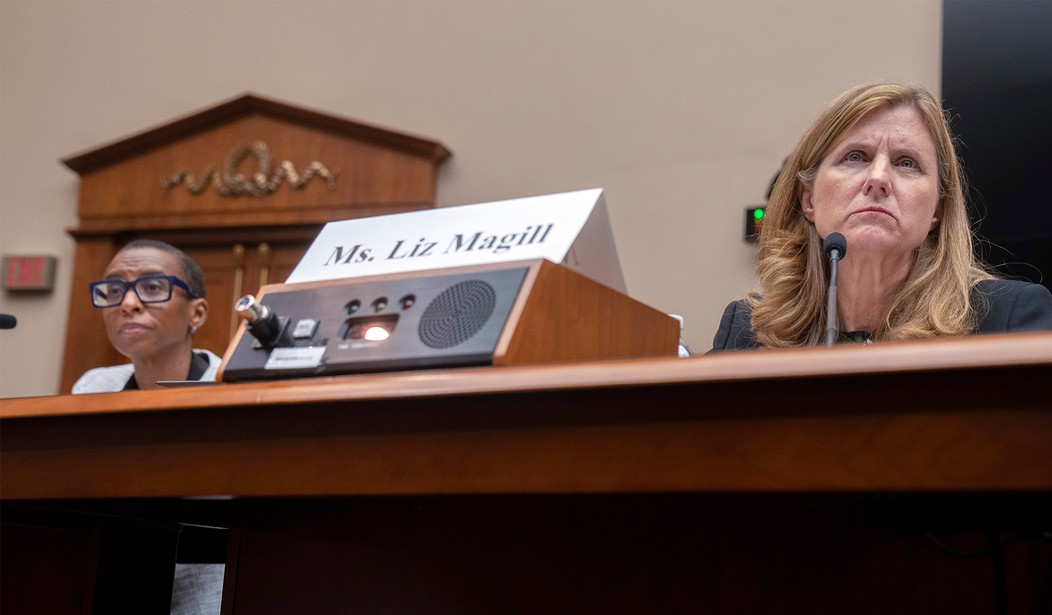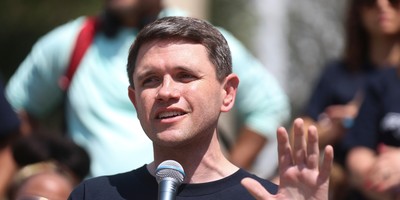After Hamas' Oct. 7 terror attack against Israel, which, according to the Israel's prime minister's office, killed over 1,200 people in Israel and injured 6,900, pro-Palestinian protests took place on college campuses across America. Pro-Palestinian protesters demonstrated at some of the most elite schools, including Harvard, the University of Pennsylvania and the Massachusetts Institute of Technology.
At Harvard, an estimated 200 Harvard law students staged a rally in support of the Palestinians. Harvard President Claudine Gay publicly condemned the phrase -- chanted by some protesters -- "From the river to the sea, Palestine will be free," properly interpreted as calling for the elimination of Israel. But 100 members of the Harvard faculty sent an open letter calling Gay's criticism "imprudent as a matter of university policy and badly misjudged as an act of moral leadership." The letter said the phrase has "a long and complicated history." Over 100 Harvard students held a "study in" at the school's Widener Library, holding signs that read "No normalcy during genocide. Justice for Palestine." Many Jewish college students said they feared for their safety and that their schools were not doing enough to guarantee their security.
The presidents of Harvard, the University of Pennsylvania, and MIT appeared before Congress to answer questions about the pro-Palestinian campus protests and whether they violated the school's code of conduct.
University of Pennsylvania President Mary Magill had these exchanges with Rep. Elise Stefanik, R-N.Y.
Stefanik: "Does calling for the genocide of Jews violate Penn's rules or code of conduct, yes or no?"
Recommended
Magill: "If the speech turns into conduct, it can be harassment."
Stefanik: "I am asking, specifically: Calling for the genocide of Jews, does that constitute bullying or harassment?"
Magill: "If it is directed and severe, pervasive, it is harassment."
Stefanik: "So the answer is yes."
Magill: "It is a context-dependent decision, congresswoman."
Stefanik: "That's your testimony today? Calling for the genocide of Jews depends on the context?"
Harvard's Gay gave a similar response. But after fierce criticism, she later told the school's newspaper, the Harvard Crimson: "(I) got caught up in what had become at that point, an extended, combative exchange about policies and procedures. What I should have had the presence of mind to do at that moment was return to my guiding truth, which is that calls for violence against our Jewish community -- threats to our Jewish students -- have no place at Harvard and will never go unchallenged."
A Harvard law professor defended Gay, stating, "Constitutional guarantees of free speech and free press do not permit a state to forbid or prescribe advocacy of the use of force or law unless violation except where such advocacy is directed to inciting or producing imminent lawless action..."
Two problems. First, a private school, Harvard is not "a state." The First Amendment to the U.S. Constitution says, "Congress shall make no law... abridging the freedom of speech." Harvard can and, in fact, publish codes of conduct about speech and behavior. Harvard's free speech guidelines say: "Curtailment of free speech undercuts the intellectual freedom that defines our purpose."
Second, regarding the "curtailment of free speech," Harvard, according to a study by the Foundation for Individual Rights and Expression, looks like a serial offender. As to things like "openness," "tolerance," and "administrative support for free speech," Harvard, based on a survey of 55,000 students at 248 schools, ranks last. The report said that in the last five years, Harvard sanctioned seven scholars, students, student groups, and speakers for speech supposedly protected by Harvard's free speech code. "Fifty-eight percent of (Harvard) students," according to the report, "say they are worried about damaging their reputation because someone misunderstands something they have said or done."
Colleges profess openness, tolerance, and a commitment to diversity. But they sing a different tune when it comes to ideological diversity. According to former Harvard professor Alan Dershowitz, "less than three percent" of the school's faculty "identify as conservative." A 2017 study in Econ Journal Watch examined the party registrations of college professors at 40 top colleges and universities. In five departments, Democrats outnumbered Republicans 11.5-to-1.
This explains the tone-deafness during the congressional hearing by the heads of these elite schools. Who, in a village of the tone-deaf, stands up to say, "Maybe we're being a little tone-deaf"?
Larry Elder is a bestselling author and nationally syndicated radio talk show host. To find out more about Larry Elder, or become an "Elderado," visit www.LarryElder.com. Follow Larry on Twitter @larryelder. To read features by other Creators Syndicate writers and cartoonists, visit the Creators Syndicate webpage at www.creators.com.

























Join the conversation as a VIP Member